

“The two most important days in your life
are the day you are born and
the day you find out why.”
Mark Twain
“Attraversiamo” (Cross Over) by Dario Marianelli (courtesy of Letizia1989):
“No one should place their dreams in the hands
of those who might destroy them.”
Paulo Coelho
“Dreams” by Fleetwood Mac:
Dreams are made to be followed, even if they end up as an illusion; one’s life is meant to be lived to the full. Some books are meant to be read, loved, inspire, and then re-read over and over again. Paulo Coelho’s book The Alchemist is such a book. His books have an enormous impact on people and have sold more than 140 million copies worldwide. They have been translated into 72 languages. Paulo Coelho has been awarded numerous prestigious awards, among them the Crystal Award by the World Economic Forum and France’s Legion d’Honneur. In 2002 he was introduced into the Brazilian Academy of Letters. One could ask what has made his books such an incredible success? It isn’t that obvious, but his writing is speaking directly to our souls and our hearts, reaching the hidden recesses we have forgotten about. He isn’t ashamed to talk about issues we would not raise in conversation, even with our friends.
“What is a personal calling?”, he asks, “It is God’s blessing, it is the path that God chose for you here on Earth. Whenever we do something that fills us with enthusiasm, we are following our legend. However, we don’t all have the courage to confront our dreams. Why?”
Perhaps, the simplistic answer would be that life’s responsibilities prevent us from pursuing our dreams. By reading how the shepherd boy, Santiago was following his calling across the meadows of Andalusia, cities of North Africa, through the dunes of the Sahara desert, where he meets the Alchemist, to Egypt’s Pyramids, and finally finding what he was searching for on his doorstep, back in Andalusia, enchants and inspire us in equal measures. And that is when we start our own dreams.
“Santiago’s Dream” from “The Alchemist’s Symphony” by Walter Taieb, performed by Lucas Richman and Los Angeles Philharmonic Orchestra:
An illustration of Andalusia from The Alchemist, where it all started and where it finished.
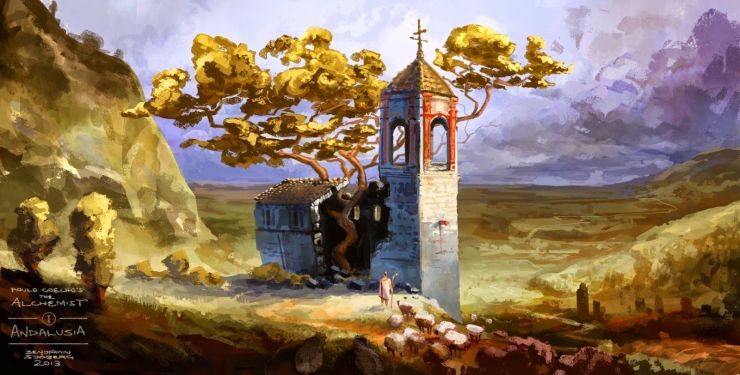
“Hable con ella” (Talk to Her) by Albert Iglesias (courtesy of Szemkeő András):
PAULO COELHO

Courtesy of CBS Sunday Morning:
Paulo Coelho was born in Rio, Brazil on 24 August 1947. His father Pedro Queima Coelho de Souza, was an engineer, and his mother, Lygia, a housewife. In Portuguese, Coelho means rabbit. He attended a Jesuit school, where he discovered his passion for writing. When you are born a writer, you have no choice, the need to write is overwhelming and you have to follow the hand that guides you. His parents had no understanding of his compulsion and thought that he was mentally ill. They committed him to a mental institution when he was seventeen twice, where he endured sessions of electroconvulsive ‘therapy’. When he started to work as a journalist, he was once more committed by his father to the mental hospital.
Rio de Janeiro

“À Chloris” (Arr. for Cello and Orchestra) by Reynaldo Hahn, performed by Sol Gabetta and Prague Philharmonic Orchestra:
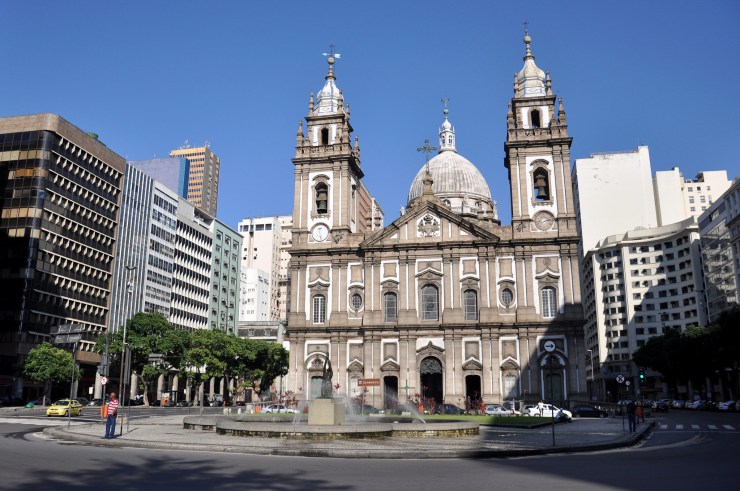

This barbaric treatment could have broken a less resilient man but it made Paulo more adventurous and non-conformist, a traveller across Latin America. He was involved with a movement for free speech, imprisoned and tortured. He had a vision of a man, and two months later, while staying in Amsterdam, he met the man from his vision in a cafe. The stranger advised him to study the benign side of magic. He also suggested that Coelho walked the Road to Santiago, the medieval pilgrim route. After Coelho came back from the pilgrimage, he wrote his book about the experience and how it changes in an extraordinary way people’s lives, The Pilgrimage. As I saw two documentaries on the pilgrimage to Santiago, I was interested in Coelho’s views as it is a well-known fact that all the pilgrims are deeply affected by the experience.


“Santiago de Compostela” by Tyler Bates:



How might we find pilgrimage in the everyday? (courtesy of The On Being Project):
A year later, he wrote a different in every way book about dreams, The Alchemist. The first edition sold only nine hundred copies, and the small publisher he used, decided not to reprint it. Coelho found a bigger publisher, and in a short time, both The Pilgrimage and The Alchemist were on the bestseller list. And the rest is history.
So far, Coelho wrote several books: The Valkyries, By the River Piedra I Sat Down and Wept, The Fifth Mountain, Eleven Minutes, and others. In 2002 The Alchemist was awarded the title of the most sold book in the Portuguese language by the Jornal de Letras de Portugal, the greatest literary authority in the Portuguese language. Another of Paulo Coelho’s books, Eleven Minutes was named as the world’s bestselling fiction title by USA TODAY, Publishing Trends.
Paulo Coelho in his own words on writing:
Paulo Coelho and his wife, Christina Oiticica
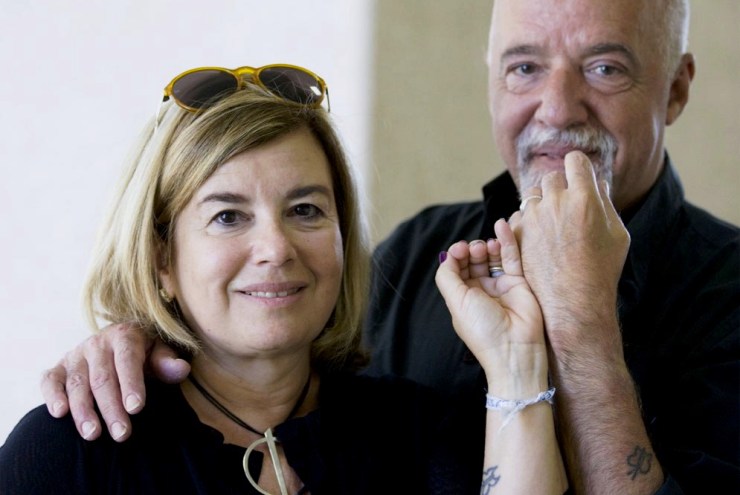
Paulo Coelho and his wife, Christina Oiticica, are the founders of the Paulo Coelho Institute, which provides support and opportunities for the underprivileged communities in Brazil.
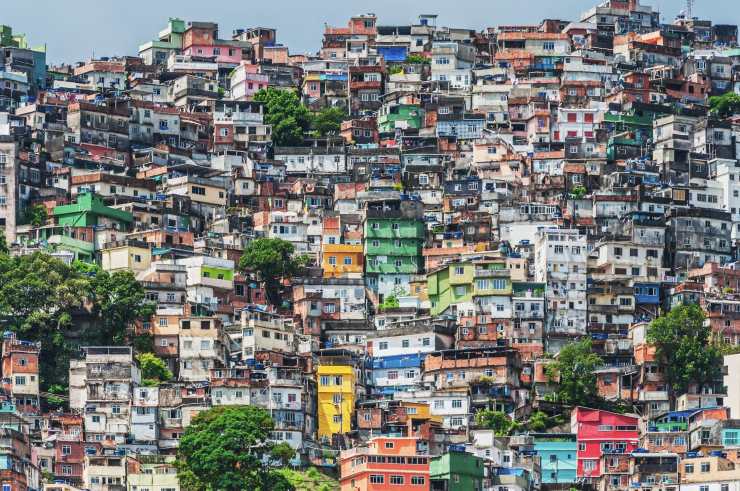
To let you fully appreciate the uniqueness of The Alchemist, here are a few extracts:
“For nearly a year, he had been working incessantly, thinking only of putting aside enough money so that he could return to Spain with pride.
‘Never stop dreaming,’ the old king had said, ‘Follow the omens.'”
Courtesy of HarperOne:
Tangier
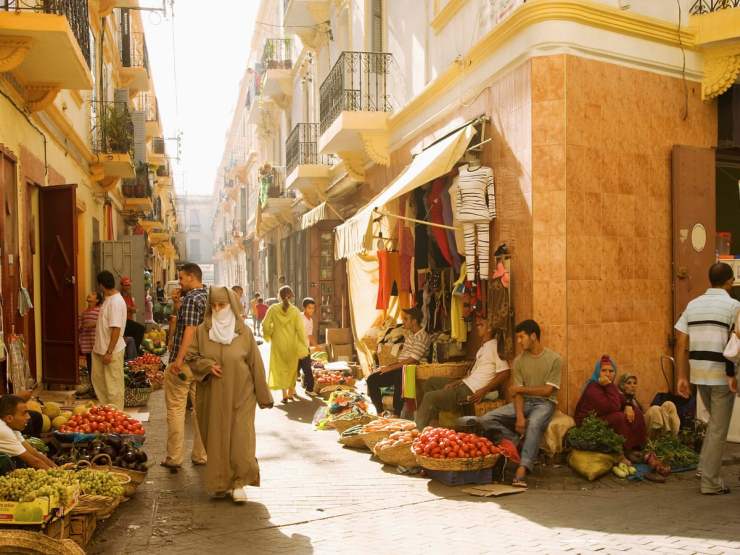
“The boy picked up Urim and Thummim, and, once again, had the strange sensation that the old king was nearby. He had worked hard for a year, and the omens were that it was time to go. I’m going to go back to doing just what I did before, the boy thought. Even though the sheep didn’t teach me to speak Arabic. But the sheep had taught him something even more important; that there was a language in the world that everyone understood, a language the boy had used throughout the time that he was trying to improve things at the shop. It was the language of enthusiasm, of things, accomplished with love and purpose, and as part of a search for something believed in and desired. Tangier was no longer a strange city, and he felt that, just as he conquered this place, he could conquer the world.
‘When you want something, all the universe conspires to help you achieve it,’ the old king had said. He waited patiently for the merchant to awaken and open the shop. Then the two went off to have some more tea.”

“‘I am leaving today’ said the boy. ‘I have the money I need to buy my sheep. And you have the money you need to go to Mecca.’
The old man said nothing. ‘Will you give me your blessing?’ asked the boy. ‘You have helped me.’ The man continued to prepare his tea, saying nothing. Then he turned to the boy.
‘I am proud of you,’ he said. ‘You brought a new feeling into my crystal shop. But you know that I’m not going to go to Mecca. Just as you know that you’re not going to buy your sheep.’
‘Who told you that?’ asked the boy startled.
‘Maktub*,’ said the old crystal merchant. And he gave the boy his blessing.
*It is written (by the hand of God).”
The Kaaba in Mecca

“Because it’s not love to be static like the desert, nor is it love to roam the world like the wind. And it is not love to see everything from a distance like you do. (the boy is addressing the Sun) Love is the force that transforms and improves the Soul of the World. When I first reached through to it, I thought that the Soul of the World was perfect. But later, I could see that it was like other aspects of creation, and had its own passions and wars. It is we who nourish the Soul of the World, and the world we live in will be either better or worse, depending on whether we become better or worse. And that’s where the power of love comes in. Because when we love, we always strive to become better than we are.”

“In the silence, the boy understood that the desert, the wind, and the sun were also trying to understand the signs written by the hand, and were seeking to follow their paths, and to understand what had been written on a single emerald. He saw that omens were scattered throughout the earth and in space, and that there was no reason or significance attached to their appearance; he could see that not the deserts, nor the winds, nor the sun, nor people knew why they had been created. But that the hand was a reason for all of this, and that only the hand could perform miracles, or transform the sea into a desert. Because only the hand understood that it was a larger design that had moved the universe to the point at which six days of creating had evolved into a Master Work.”
Below is a real photograph of unusual, but poignant cloud formation

“The boy reached through to the Soul of the World, and saw that it was a part of the Soul of God. And he saw that the Soul of God was his own soul. And that he, a boy, could perform miracles.”
“Desert Rose” by Sting and Cheb Mami (courtesy of Jack Nature Travel):
A sand storm in the desert – the Wind

The above extract is of great importance and significance; it combines and reaffirms the beliefs of all world religions: the existence of the world’s one and only Creator, and that the god lives in each and one of the souls that he created. And as such we are able, if we are passionate enough about things around us, to perform miracles. Although I have only several thousand people in 114 countries reading my blog and not billions, I am receiving from all parts of the world the same message as Coelho’s in The Alchemist.
This was the message, Rachel Carson wrote in Silent Spring, (the USA):
“As far as I am concerned, there is absolutely no conflict between a belief in evolution and belief in God as the creator. Believing as I do in evolution, I merely believe that is the method by which God created, and is still creating, life on earth. And it is a method so marvellously conceived that to study it in detail is to increase – and certainly never to diminish – one’s reverence and awe both for the Creator and the process.”
The same message came from India, written by Swami Vivekananda:
“I have understood this as the highest truth: God is present in every being. There is no other God besides that. He who serves all beings serves God indeed.”
From Japan, Myoshi posted:
“You have seen how the power of the spirit can work. It’s the beneficent will and enables you a clear glimpse into the plan and purpose that is behind all earthly life. As a result, you each become links in an infinite chain which ultimately must embrace the whole of humanity because these links are of the spirit and spiritually all mankind is one.”
From England, Joanna:
“I always believed that although in different parts of the world people pray in different places of worship, be it churches, temples, synagogues, mosques or shrines, and are using different names to call their god’s name, it is the same God, The Creator of the World, who lives in our souls and our hearts.”
Here, more thoughts from the Master, Paulo Coelho:
“But the caravan began to move, and it was impossible to hear what the Englishman was saying. The boy knew what he was about to describe, though the mysterious chain that links one thing to another, the same that had caused him to become a shepherd, that had caused his recurring dream, that had brought him to a city near Africa, to find a king, and to be robbed in order to meet a crystal merchant, and…
The closer one gets to realising his destiny, the more that destiny becomes his true reason for being, thought the boy.”
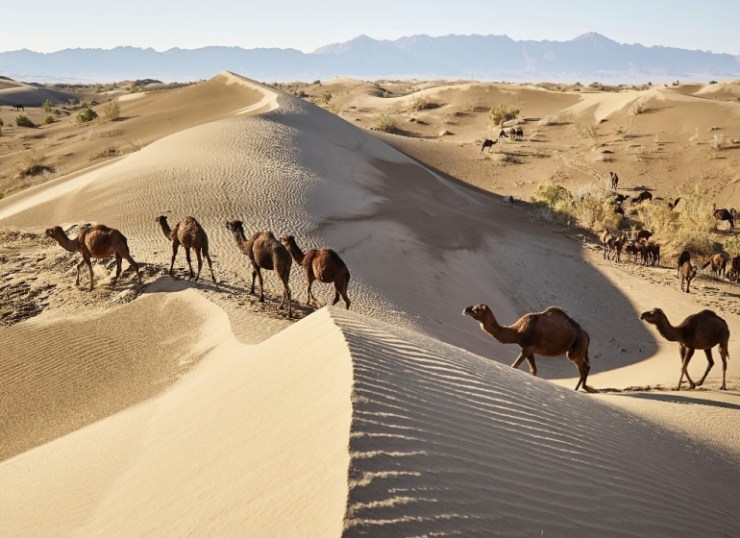
The above picture is taken from the blog of Dr Raziq, arkbiodiv.com
“The caravan moved toward the east. It travelled during the morning, halted when the sun was at its strongest, and resumed late in the afternoon. The boy observed in silence the progress of the animals and people across the desert. Now everything was quite different from how it was that day they had set out: then, there had been confusion and shouting, the cries of children and the whinnying of animals, all mixed with the nervous orders of the guides and the merchants.
But in the desert, there was only the sound of the eternal wind, and of the hoofbeats of the animals. Even the guides spoke very little to one another.
“I’ve crossed these sands many times,” said one of the camel drivers one night. “But the desert is so huge, and the horizons so distant, that they make a person feel small, and as if he should remain silent.”
The boy understood intuitively what he meant, even without ever having set foot in the desert before. Whenever he saw the sea or a fire, he fell silent, impressed by their elemental force. I’ve learned things from the sheep, and I’ve learned things from crystal, he thought. I can learn something from the desert, too. It seems old and wise. But he was excited at his intuitive understanding of the camel driver’s comment: maybe he was also learning the universal language that deals with the past and the present of all people. “Hunches”, his mother used to call them. The boy was beginning to understand that intuition is really a sudden immersion of the soul into the universal current of life, where the histories of all people are connected, and we are able to know everything because it’s all written there.
“Maktub”, the boy said, remembering the crystal merchant.”
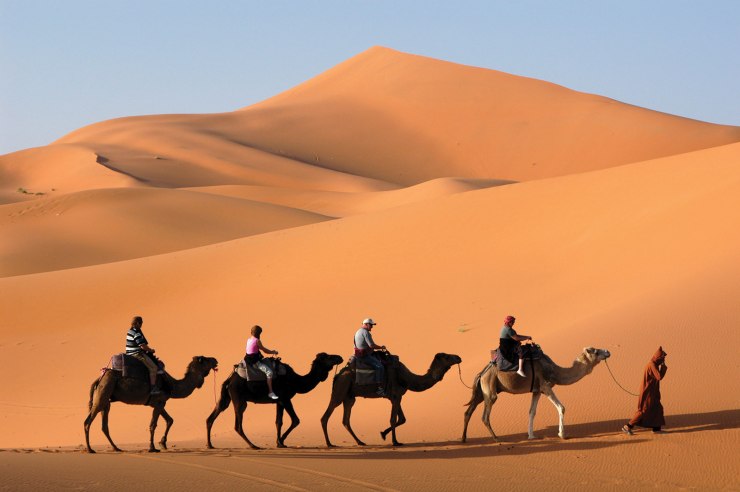
Excerpt from “Scheherezade, II. The Tale of the Kalendar Prince” by Nikolai Rimsky-Korsakov (courtesy of juancitoamericano):
In the Literary Series, I review books worth reading, and for this reason, I feel that I have to say something about Coelho’s other book, Eleven Minutes, as it is, after The Alchemist, his most read one. It deals with sexuality as an expression of God’s gift to us. The misguided, the prudish, and naturally asexual, might be wise to give it a miss.
My views echo Coelho’s, as if the Creator of the World didn’t want us to have a desire for each other, he would have created us without it. But then the human race would not exist after Adam and Eve. I will let the Master explain in his eloquent way.
“By accepting that sex is a physical manifestation of God, and that is not a sin – it is a blessing. And then by understanding that except for two things that I consider to be really sick – rape and paedophilia – you are free to be creative. It’s up to you, how you do this. Sex was always surrounded by taboos, and I don’t see it necessarily as a manifestation of evil. I think that sexuality is first and foremost the way that God chooses for us to be here on earth, to enjoy this energy of love in the physical plane. And by this understanding, and practicing, we are helping God.”
“Les Larmes de Jacqueline” (Jacqueline’s Tears) by Jacques Offenbach, performed by Werner Thomas and Münchener Kammerorchester:
And here, I leave you with the last word of the Master:
“As he was about to climb yet another dune, his heart whispered, ‘Be aware of the place where you are brought to tears. That’s where I am, and that’s where your treasure is.'”

“Nocturne” from “Lady Caliph” by Ennio Morricone, performed by Yo-Yo Ma:
“The boy climbed the dune slowly. A full moon rose again in the starry sky: it had been a month since he had set forth from the oasis. The moonlight cast shadows through dunes, creating the appearance of a rolling sea; it reminded the boy of the day when that horse had reared in the desert, and he had come to know the alchemist. And the moon fell on the desert’s silence, and on a man’s journey in search of treasure. When he reached the top of the dune, his heart leapt. There, illuminated by the light of the moon and the brightness of the desert, stood the solemn and majestic Pyramids of Egypt.”

“The boy fell to his knees and wept. He thanked God for making him believe in his destiny, and for leading him to meet a king, a merchant, an Englishman, and an alchemist.”
“There is only one thing
that makes a dream
impossible to achieve:
the fear of failure.”
Paulo Coelho

The inspiration for the The Alchemist’s Symphony (courtesy of Walter Taieb):
For those who have the time to enjoy, in full The Alchemist’s Symphony accompanied by text summary (courtesy of Walter Taieb):

A wonderfully interesting story of an amazing writer! I cannot imagine what his parents were thinking when he was a young man. This has a feel of James Mitchner’s writings as well. Well done, Joanna!
LikeLike
Thank you, Dwight, for your comment. Greatly appreciated.
Joanna
LikeLiked by 1 person
You are most welcome, Joanna!
LikeLike
Such a beautiful post!
LikeLike
Thank you, Dawn, for your kind comment.
Joanna
LikeLiked by 1 person
I love the Mark Twain quote.
LikeLike
Joanna,
Another introduction to Great Books has added to my reading list: The Alchemist and Eleven Minutes.
This blogpost is Mystical and Magical, Musical and Masterful, Creational and Coherent, Experiential and Inspirational while at once thought and action provoking. It is another creation with Feeling. Love, Hope and Honesty. Applause for another masterpiece comes your way. Stewart
LikeLike
Thank you, Stewart, for the wonderful comments! The Alchemist is one of the most read books, and highly recommended.
Thank you again, Stewart, with great appreciation.
Joanna
LikeLiked by 1 person